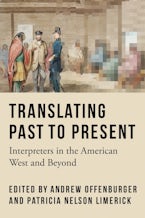List of Illustrations
Acknowledgments
Introduction
Andrew Offenburger and Patricia Limerick
A Message and a Dance for Zebulon Pike
Part 1. Interpreting for and with Empire
1. From Indigenous Interpreters to Creole Control: Race, Translation, and Exclusion in Yucatan, 1560–1633
Mark Lentz
Misinterpreting for James Wilkinson
2. Captains of Civility: The Indigenous Interpreters of North America Who Attempted to School Settler Colonists on the Ideals of Civil Community
Nicole Eustace
Maungwudaus Maintains Peace
3. William Wells . . . Interpreter?
Cameron Shriver
Ma-Son-Ne John Simpson Smith
Part 2. Along the Borders of Consolidating Power
4. Translating Slavery
Alice Baumgartner
Jeffrey Deroine, Freedman and Ioway Interpreter
5. The Interpreter Generation: Boarding School Survivors, Euro-American Scholars, and Chiricahua Apache History in the Twentieth Century
Paul Conrad
Changing Names
6. Diplomacy in the Aftermath of Pancho Villa’s Raid: Consul Antonio LandÍn in Columbus, 1917–1920
Brandon Morgan
John Collier: No Hands Raised
7. Interpreters of DinÉ dÓÓ GÁamalii Oral Histories
Farina King
Rough Interpretations
Part 3. Interpreting in Practice
8. “Do You Solemnly Swear to Interpret Accurately and without Bias?”: Professional Court Interpreting in the Twentieth and Twenty-First Century
Taylor Cozzens
Dueling Interpretations
9. Puente, ຂົວ, Bridge: Interpreting for Social Transformation in Storm Lake, Iowa
Andrew Offenburger
Interpreting for and in Vietnam
10. Keeping Faith: Interpreters in the Global War on Terror
Zach Guiliano
Call Me Phillip Morris
Contributors
Index

